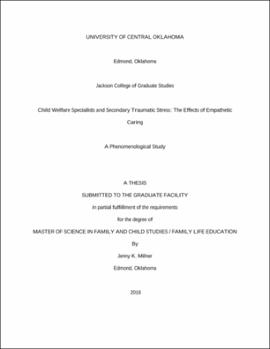Child welfare specialists and secondary traumatic stress : the effects of empathetic caring : a phenomenological study
Abstract
Working with abused and neglected children is one of the most difficult jobs imaginable. The stressful conditions of a Child Welfare Specialist or supervisor are enormous and they often internalize the traumatic stress of their young clients and their families. This type of traumatic stress, referred to as Secondary Traumatic Stress (STS), inputs its toll on these employees each and every day making their jobs even more difficult. The research on this topic shows that positive coping mechanisms and peer support are greatly effective at combatting STS and the anxiety, depression and physical ailments that it produces. The main focus of this phenomenological study is to examine the ways STS affects the Child Welfare Specialists and supervisors of the Oklahoma Department of Human Services (OKDHS). It also seeks to find which positive and negative coping mechanisms are being applied to combat this type of stress and in what ways the agency can make changes to better care for its Child Welfare front-line staff and their mental health needs. Ten front-line employees of the OKDHS Child Welfare Services division were recruited to participate in an interview regarding their experiences as Child Welfare Specialists. Two common themes emerged after reviewing the interview transcriptions and selective highlighting: The need for accessible mental health resources and specialized training. Counseling for workers who experience the effects of STS should be available and easily accessible. The current arrangement for mental health services is not conducive to those employees working 40+ hour work weeks, on-call and weekend hours. A need for more specialized training is also a factor. Workers leaving CORE (specialized training for new Child Welfare staff) often feel completely unprepared for the realities of a child welfare caseload and the trauma they will face.
Collections
- UCO - Graduate Theses [722]
